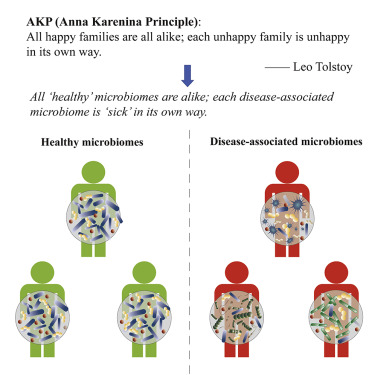iScience ( IF 5.8 ) Pub Date : 2020-03-25 , DOI: 10.1016/j.isci.2020.101007 Zhanshan Sam Ma 1

|
The AKP (Anna Karenina principle), which refers to observations inspired by the opening line of Leo Tolstoy's Anna Karenina, “all happy families are all alike; each unhappy family is unhappy in its own way,” predicts that all “healthy” microbiomes are alike and each disease-associated microbiome is “sick” in its own way in human microbiome-associated diseases (MADs). The AKP hypothesis predicts the rise of heterogeneity/stochasticity in human microbiomes associated with dysbiosis due to MADs. We used the beta-diversity in Hill numbers and stochasticity analysis to detect AKP and anti-AKP effects. We tested the AKP with 27 human MAD studies and discovered that the AKP, anti-AKP, and non-AKP effects were exhibited in approximately 50%, 25%, and 25% of the MAD cases, respectively. Mechanistically, AKP effects are primarily influenced by highly dominant microbial species and less influenced by rare species. In contrast, all species appear to play equal roles in influencing anti-AKP effects.
中文翻译:

在人类微生物组相关疾病中测试Anna Karenina原理。
AKP(安娜·卡列尼娜原理)指的是受列夫·托尔斯泰的《安娜·卡列尼娜》(Anna Karenina)开场白启发的观察结果,“所有幸福的家庭都是相似的;每个不幸的家庭都会以自己的方式感到不高兴。”预测说,所有“健康”微生物群落都是相似的,并且每个与疾病相关的微生物组在人类微生物相关疾病(MAD)中都以自己的方式“病”。AKP假说预测了与MADs引起的营养不良相关的人类微生物组异质性/随机性的上升。我们使用希尔数的β多样性和随机性分析来检测AKP和抗AKP效应。我们用27项人类MAD研究测试了AKP,发现AKP,抗AKP和非AKP效应分别在大约50%,25%和25%的MAD病例中表现出来。机械上,AKP效应主要受高度优势微生物物种的影响,而较少受稀有物种的影响。相反,所有物种在影响抗AKP效果方面似乎起着同等作用。



























 京公网安备 11010802027423号
京公网安备 11010802027423号